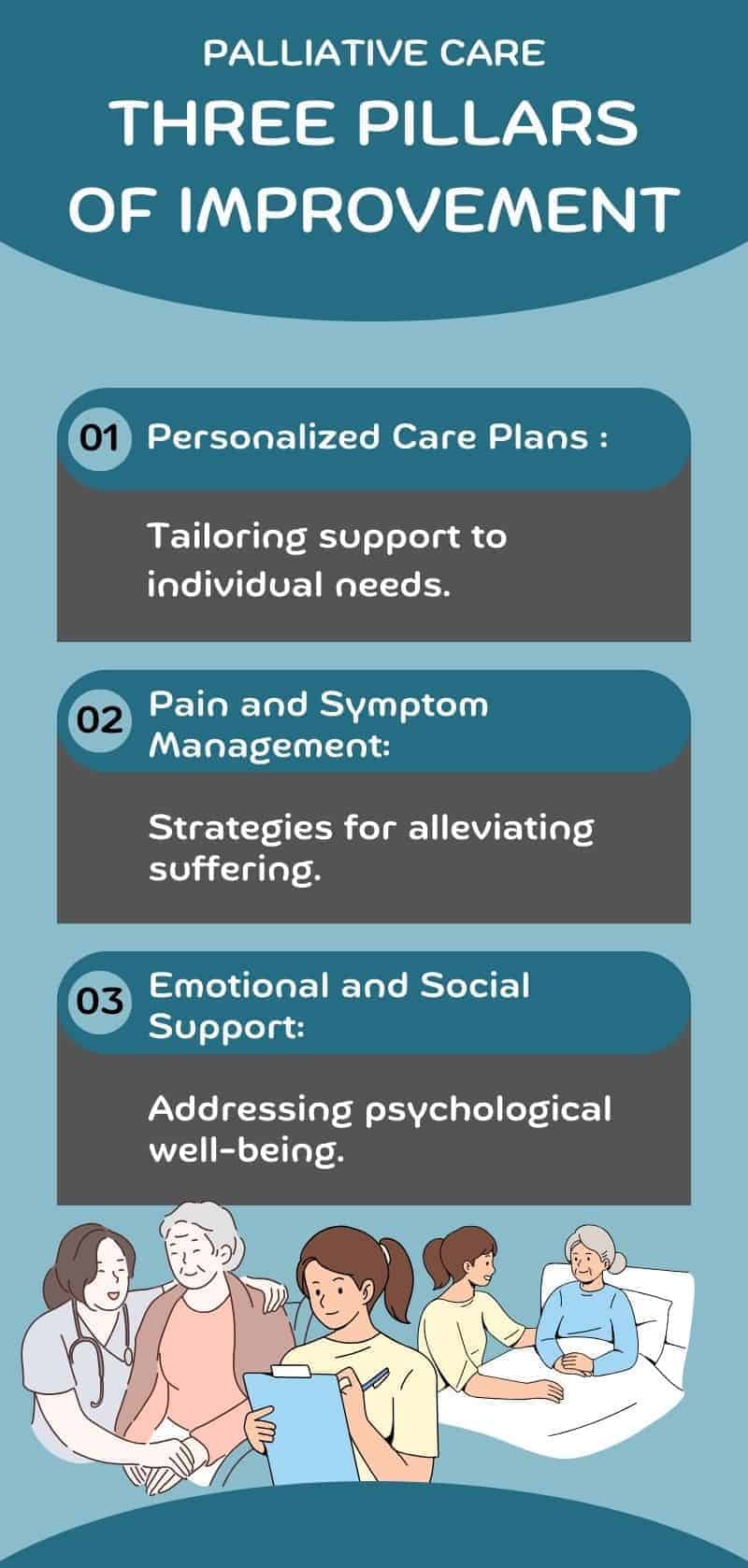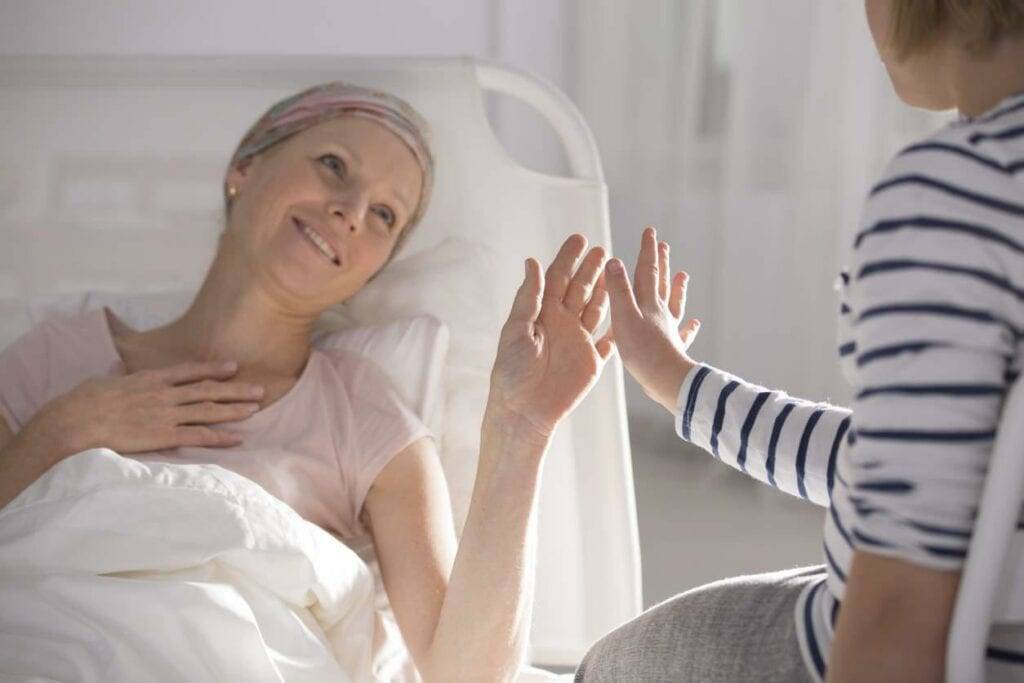
Palliative care programs are the pillar of support for people with serious illnesses. For instance, if a loved one has dementia and it reaches the last stage, the healthcare provider will enroll them in a palliative care program, which includes curative methods, symptom control, pain management, and emotional support for them and the rest of the family members.
Learn more about how incorporating palliative care into senior care services can improve your loved one’s quality of life and how such a move can benefit the patient, family, and caregivers.
Components of Palliative Care Programs
An effective palliative care program has multiple components covering all patient’s needs. From pain management to boosting quality of life, various care providers work collaboratively to support the person with a serious health condition.
Palliative care clinic: Providing specialized care and support
Unlike standard senior care or home service agencies, a palliative care clinic or center offers specialized care for people with late-stage cancer, dementia, or complex health issues. At this stage, the patient is almost dependent on the caregiver and providers for daily support and function.
Hence, services at palliative care clinics are high-level and more demanding than your regular home care service. In addition, caregivers have high professional knowledge and training on the environment and provision of palliative care, unlike your typical caregivers.
Palliative care clinics work hand-in-hand with other care providers to ensure every patient’s needs are met. A network of multiple care professionals consisting of the care team collaborates to support the patient at a holistic level.
Palliative care team: Collaboration for holistic care
Consisting of various care experts, the palliative care team aims to meet every healthcare goal to improve their well-being. It can include controlling the severity of symptoms, reducing the pain they’re experiencing, and monitoring and tracking the treatment progress.
Role of different professionals
The palliative care team is made up of many care professionals.
- Physicians: They guide the treatment plan and conduct medical assessments, prescribe medications, and track the progress or decline.
- Nurses: They assist the doctors and do the legwork of managing symptoms, administering medications, and providing ongoing care.
- Caregivers: They assist the nurse in delivering ongoing care and performing other daily activities.
- Chaplains or spiritual care providers: They provide counseling, facilitate conversations on life values, and ensure the patient’s spiritual needs are met.
- Psychologists: They offer mental health support and teach the patient and families coping strategies.
- Social workers: They offer emotional support, assist in advance care planning, and coordinate with other people to make community resources accessible.
- Volunteers: They are often family members who provide companionship and respite care.
- Care Managers: They’re in charge of communicating the treatment details among the care team members so everyone is up-to-date on the progress and changes.
- Bereavement specialists: Should the patient pass, they offer support and resources to help families overcome their grief.
In managing a serious illness, every representative of the care team must work together. A collaborative, interdisciplinary approach is key for the patient to receive optimal care and support.
Palliative care resources: Accessing information and support
Both the families and caregivers can leverage technology to access relevant care information to improve the patient’s health condition.
Families, patients, and their caregivers can turn to online platforms and resources to access the information they need. Online platforms like the International Association for Hospice and palliative care and National Hospice and Palliative Care Organizations provide access to important care details, including the latest info on palliative care and training resources for professionals.
Improving Quality of Life through Palliative Care Programs

The ultimate goal of palliative care is to improve your loved one’s quality of life. It’s possible in three ways: by offering a personalized care plan, managing pain and symptoms, and providing emotional and social support.
1. Personalized care plans: Tailoring support to individual needs
The best thing about palliative care is the tailored care to support the particular needs of your loved one. It’s not a one-size-fits-all dynamic, but a holistic approach. The treatment program is customized to the patient’s unique health situation, stage of their disease, and overall ability to increase the likelihood of positive outcomes. Here are two ways to achieve personalization in the treatment plan.
Assess and address physical, emotional, and social needs of patients
With a tailored treatment plan, the care providers can work in harmony to continue to support your loved one’s general health. By considering the level and nature of the physical, emotional, and social needs of the patient, the healthcare team can come up with curative programs with low risk for adverse effects, increasing the effectiveness of interventions.
Enhance patients’ ability to define care goals and make informed decisions
By improving the patient’s condition through an individualized care program, they’ll be in a better headspace to participate in making informed care decisions. They’ll feel more empowered and in control of their life and health when they get more involved in the treatment process and decision-making.
2. Pain and symptom management: Strategies to alleviate suffering
People with terminal illnesses experience a great deal of pain daily. Care providers can boost their quality of life by reducing the distress caused by their aching body, sore muscles, and other major discomforts. Two considerations are critical for pain and symptom management.
Importance of effective pain management in palliative care
The pain management strategies should be effective and as much as possible, not create another symptom by leaving an adverse reaction or side effect. Here are various pain and symptom management techniques public and private healthcare providers use.
- Counseling and therapy
- At-home remedies
- Medications
- Hands-on treatments, like massages
- Injections, including steroids
Utilizing holistic approaches for symptom control and comfort
In line with personalized treatment, it makes sense health-wise to take the holistic approach for symptom control. Even if your senior mom or dad has the same late-stage dementia as the other person, they will manifest symptoms unique to them. Healthcare techniques or practices to control the symptoms must be patient-focused.
3. Emotional and social support: Addressing psychological well-being

Finally, improving quality of life means supporting a loved one emotionally and socially. Being seriously ill can impact your loved one’s emotional and social health. As their mobility is reduced, they can no longer hang out with friends, leading to loneliness, withdrawal, and even mental health concerns.
Based on a study, people who have serious, chronic, and terminal illnesses are at an elevated risk for depression and anxiety. About 40% of patients who received a cancer diagnosis reported experiencing significant distress, including serious worry, depression, panic attacks, and PTSD.
Role of counseling, therapy, and support groups in palliative care programs
Essential components of palliative care programs are counseling and therapy to help reframe the patient’s mind about their health situation. A therapist can teach and help them practice proper mechanisms for coping with the distress, including how to improve self-expression to the extent that they can discuss the possibility of end-of-life concerns with the family. Support groups can help in the same way.
Strengthening social connections and fostering a sense of community
The family and people around can be a source of support for the patient to combat isolation, loneliness, and mental problems. They can help promote social connectedness by seeing their ill loved one more often and having meaningful conversations with them.
Palliative Care Programs and Family Involvement

Data confirms that if families participate in care, the outcomes are better. What’s more, it also reduces relapse and hospitalization rates, which is beneficial for the family as it lowers incurred treatment costs. Family and caregiver participation is a crucial ingredient in the patient’s health outcomes.
Support for caregivers: Recognizing their essential role
Caregivers both formal and informal directly handle and provide for the needs of the patient. They have an important role to fill and their contributions greatly matter in the success of the palliative care plan. As such, family members should cooperate and ensure that primary caregivers have access to resources, information, and respite care to effectively do their job.
Addressing the needs of families: Acknowledging their emotional journey
The illness also negatively impacts the quality of life of the whole family. It can bring a host of concerns, such as stress due to the lack of sleep, anxiety, and excessive worries. Some family members will reduce their social, leisure, and daily activities to take care of their loved ones. In some cases, it can also affect the careers and the education of younger family members.
The good thing about palliative care programs is they include family support. Holistic care acknowledges the needs of not only the patient but also the children, grandchildren, and relatives of seriously or terminally ill patients. So part of the treatment plan encompasses strategies to support the family in ways, like counseling and therapy.
Palliative Care Programs: Access and Challenges
Unfortunately, not everyone has convenient access to palliative care due to many reasons.
- Limited awareness: Not everyone is aware of their palliative care options.
- Healthcare system gaps: Like the bigger healthcare, inconsistent gaps exist when it comes to integrating palliative care into the system.
- Stigma: Some people have negative connotations of potential end-of-life care.
- Geographical barriers: Palliative care services can hardly reach rural areas.
- Resource allocation: There is limited funding and resources for palliative care services.
It will take a while to eliminate these barriers in palliative care. It’s a work in progress like general healthcare. Hopefully, the advancement in technology, like telehealth, can help fill the gap and increase the accessibility of these services.
Palliative Care Programs Can Elevate Quality of Life

In a nutshell, a palliative care plan should be personal, holistic, and supportive for it to increase the quality of life of the patient. This is achievable by having the right palliative care team to provide for the patient’s and family’s needs.
Amy’s Eden recognizes the value of palliative care services for seriously ill people. If you’re around Nevada, we can coordinate with various professionals to help you assemble the best palliative care team to improve your loved one’s quality of life, whether they have late-stage dementia, cancer, or other chronic diseases.
Plus, we have dedicated caregivers in our homes if you need support in taking care of your loved one in a home-like environment. Call us now to get started or to learn more about our services.




